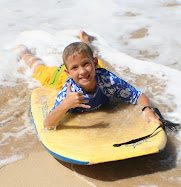I'm a believer that if you can't say anything nice, don't say anything at all, so I wasn't going to post a follow-up review on
Mountain Cabin Mystery, but something keeps nagging at me. It's not so much this series as much as it is my mistrust of book reviews. I realize everyone has differing opinions, but I have found time and again that marketing and promotion often lead to misleading book reviews. So, for the sake of honesty, I have to put pen to paper here and spill my pent up guts.
Mountain Cabin Mystery, is part of a series called
Adventure Books, which is self published and self promoted by the author, Max Elliot Anderson, and is targeted to reluctant reader boys 8-12. If you search the web for books that will get your boys reading, Max Elliot Anderson will pop up. He markets himself, dare I say, shamelessly, as a bored-with-books-kid-turned-adventure-author who now writes exciting books with the type of action, adventure, suspense and humor he couldn't find as a kid.
He claims his adventure books are constantly compared by readers and reviewers to
Huck Finn,
Tom Sawyer, Harry Potter, The Hardy Boys, Nancy Drew, Star Wars, Tom Swift, Scooby-Doo, Lemony Snicket, and adventure author, Jack London. (He had me at
Huck Finn!) These excellent reviews for
Adventure Series completely sold me and I now have the whole set in my library.
But they're just collecting dust.
I really wanted to love them, I did. And even more, I wanted my boys to love them. I even passed them to kids in the neighborhood and at my son's book club, but they just didn't catch on. This lack of interest concerned me, but for the sake of a fair review I read 3 of the books in the series,
Mountain Cabin Mystery,
Newspaper Caper and
North Woods Poachers. To be honest, I've had more adventure, suspense and humor in Sunday School.
Sorry, gotta keep it
real.The books were mediocre, sure. What else is new? There are plenty of ho hum books in the world, and kids read them and like them all the time. (
Magic Treehouse, for example). The thing that bothers me is the misrepresentation of the calibar of the books. It's highly unlikely that anyone who has ever read Jack London (
Call of the Wild flashbacks etched in my brain!) Tom Sawyer and Huck Finn (Classic!), or Nancy Drew and Hardy Boys (read them all over and over--okay, I'm starting to sound like a book nerd), would compare these beloved books to the Tweener Press
Adventure Series.
So what is my final word on the series
? It's fine, though the moral and educational overtones and undertones are extremely heavy handed and the writing is extremely safe. Even though I personally don't dig it, I do concede there is a place and an audience for this kind of series.
Call me Simon, but these books fall far short of the bold, creative, risky and genuine characters and plotlines of the aforementioned books and simply shouldn't be classified in the same catagory.
Moral of the story: Don't believe everything you read!
 Review by Garrett--August 2008
Review by Garrett--August 2008




















